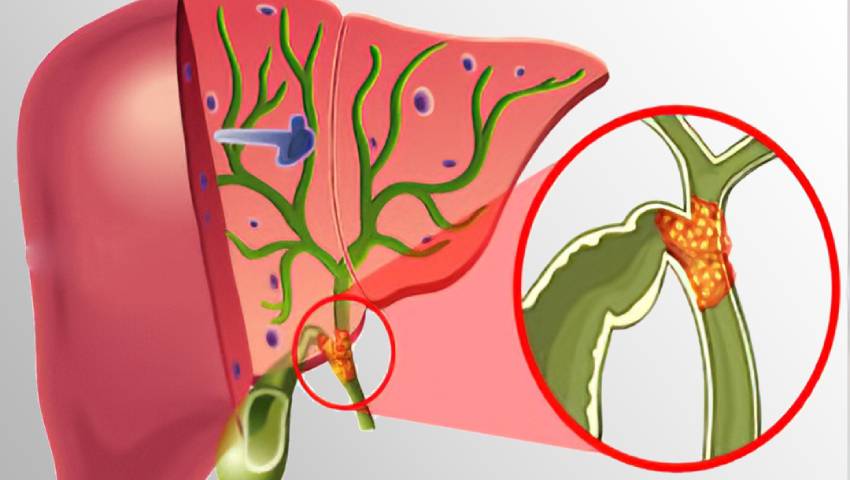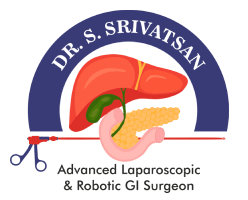
- 23/02/2024
- Dr. Srivatsan Gurumurthy
- 0 Comments
- Blog
What You Need To Know About Bile Duct Cancer
Bile duct cancer, also known as cholangiocarcinoma. It is a rare form of cancer. It often affects older adults and has usually spread beyond the bile ducts by the time it’s diagnosed. February month is celebrated the Bile Duct Cancer Awareness Month worldwide. On this occasion. Dr. Srivatsan Gurumurthy, a Robotic & Laparoscopic Surgeon in Chennai provides valuable information about bile duct cancer. He explains the bile duct cancer, it’s symptoms, types, and treatment options available of the bile duct cancer. Most people receive a cholangiocarcinoma diagnosis after the cancer has already spread outside of their bile ducts. It’s difficult to treat and the prognosis (chance of recovery) is usually poor. However, a growing number of targeted therapies and clinical trials are starting to change that.
Types of bile duct cancers by location:
Bile duct cancer (cholangiocarcinoma) can start in any part of the bile duct system. Based on where the cancers start(see the picture below), they’re grouped into 3 types:
- Intrahepatic bile duct cancers
- Perihilar (also called hilar) bile duct cancers
- Distal bile duct cancers
Symptoms of Bile Duct Cancer:
- Jaundice
- Abdominal Pain
- Itching (Pruritus)
- Unexplained Weight Loss
- Fatigue
- Pale-colored Stools
- Dark Urine
Diagnosis of Bile Duct Cancer:
- Medical History and Physical Examination: Dr Srivatsan Gurumurthy will interrogate about the existent’s symptoms, medical history, and any procurators that could elate the threat of corrosiveness conduit cancer. Dr Srivatsan Gurumurthy will also guide a thorough physical examination to identify gesticulations similar to hostility, abdominal pain, and detectable lumps
- Blood Tests: Blood tests may be performed to assess liver function and to check for elevated levels of certain substances, such as bilirubin and liver enzymes.
- Liver function tests: These liver tests check your blood for high levels of substances that might indicate your liver isn’t working as it should or there is a bile duct blockage, such as elevated liver enzymes.
- CT Scan (Computed Tomography): Dr Srivatsan Gurumurthy utilizes improved imaging ways to gain detailed cross-sectional images of the tummy, abetting in the identification of abnormalities in the liver and corrosiveness tubes. also, glamorous Resonance Imaging (MRI), a system analogous to a CT checkup, is assumed by Dr Srivatsan Gurumurthy to induce detailed images, especially salutary for imaging soft napkins.
- Ultrasound: This imaging system uses sound swells to produce images of the liver and corrosiveness tubes and can support identifying blockages or abnormalities.
- Endoscopic Retrograde Cholangiopancreatography (ERCP): This imaging system uses sound swells to produce images of the liver and corrosiveness tubes and can support identifying blockages or abnormalities.
Treatment of Bile Duct Cancer:
Treatment options encompass a combination of surgical procedures, chemotherapy, radiation therapy, and additional supportive measures.
Surgery:
- Resection: This involves surgically removing the tumor and conterminous towel, frequently involving a partial liver resection( hepatectomy) or, in improved cases, the exclusive liver.
- Whipple Procedure: For tumors near the pancreas or in the common bile duct, a Whipple procedure (pancreatoduodenectomy) may be conducted to excise affected portions of the pancreas, duodenum, bile ducts, and, at times, a portion of the stomach.
- Liver Transplant: In specific instances, a liver transplant may be contemplated for selected patients diagnosed with early-stage bile duct cancer.
- Chemotherapy: entails the administration of medicines to exclude or stymie the excrescency of cancer cells. It can be assumed pre or post-surgery to target residual cancer cells or to condense excrescences before surgical intervention.
Radiation Therapy:
Employs high-dynamism shafts to target and annihilate cancer cells. Its quittance can be foreign or internal, contingent on the excrescence’s position. Radiation remedy is constantly exercised in confluence with surgery or chemotherapy.
If you are one of the many people who suffer from a bile-duct disorder, you may be looking for a doctor who can help you get your life back on track. There are many different physicians who specialize in treating bile duct disorders, but if you want the best possible care, you should choose Dr. Srivatsan Gurumurthy, he gives the best bile duct disorder treatment in Chennai. Dr. Srivatsan Gurumurthy is a highly skilled and experienced doctor who has devoted his career to treating bile-duct disorders. He has a deep understanding of the medical issues that can cause these diseases, and he is passionate about providing his patients with the best possible care. If you are suffering from a bile duct disorder, don’t hesitate to contact Dr. Srivatsan Gurumurthy . He will help you get your life back on track.
